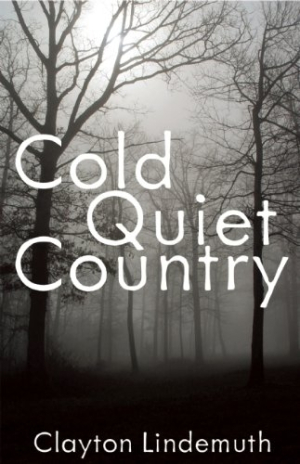Cold Quiet Country
The town of Bittersmith, Wyoming, is rarely the scene of a murder, but on a winter day in 1972, with a blizzard moving in, the sheriff takes the call from a farmer’s wife, who announces, “Gale G’Wain run him through with a pitchfork.” Just last night, Sheriff Bittersmith—the town was named after his grandfather—got the news that after forty years on the job, the town council has voted him out; today is his last day. “Forced retirement feels like they cinched my balls in a leather strap and trussed me from a tree limb,” the crusty Bittersmith muses. When he arrives at the murder scene and finds that the accused has left on foot with the farmer’s daughter, he knows that he must kill Gale G’Wain, and that he has only this one day to take him down.
Clayton Lindemuth’s stunning first novel is all about good hunting down evil on a snowbound day, but common notions about good men no longer apply in the moral darkness that is Bittersmith. To the Sheriff, “there is no higher law” than him, which means he feels entitled, which also means he is corrupt. And Gale G’Wain, named after a medieval hero by the youth home director who raised him, doesn’t look like the murderer he has been made out to be. Holed up in a vacant house with a stab wound in his leg, a hungry Gale raids the cupboard, but leaves a note: “I ate a jar of venison and a jar of peaches.”
Lindemuth’s achievement hinges on the ironic position that Gale G’Wain finds himself in. Learned from books and raised in an artificial orphanage environment, Gale takes a job at the Bittersmith farm of Burt Haudesert, where he discovers neither family nor community but a corrupt system of incest, sexual abuse, denial, and complicity, in which many of the men are of one extreme political persuasion or another. He also discovers the dirty truth of the rape that resulted in his own birth. Gale is immediately attracted to sixteen-year-old Gwen Haudesert, another victim who is “strong enough to see beauty in an ugly world.” Defiled by the father whose role is to protect her, and shunned by her mother and brothers, Gwen falls in love with Gale, who pledges to take care of her.
As Gale waits for his accusers, including Sheriff Bittersmith, to track him down, he reflects on his options: on one hand, “obedience and expeditiousness;” on the other, “standing against a world gone mad.” Through Gale, Lindemuth is unsparing in his advocacy of “an honorable fight.”
The town of Bittersmith, Wyoming, is rarely the scene of a murder, but on a winter day in the early 1970s, with a blizzard moving in, the sheriff takes the call from a farmer’s wife, who announces, “Gale G’Wain run him through with a pitchfork.” Just the night before, Sheriff Bittersmith—the town was named after his grandfather—got the news that after forty years on the job, the town council has voted him out; today is his last day. “Forced retirement feels like they cinched my balls in a leather strap and trussed me from a tree limb,” the crusty Bittersmith muses. When he arrives at the murder scene and finds that the accused has left on foot with the farmer’s daughter, he knows that he must kill Gale G’Wain, and that he has only this one day to take him down.
Clayton Lindemuth’s stunning first novel is all about good hunting down evil on a snowbound day, but the writer overturns common notions about good men in the moral darkness that is Bittersmith. To the Sheriff, “there is no higher law” than him, which means he feels entitled, which also means he is corrupt. And Gale G’Wain, named after a medieval hero by the youth home director who raised him, doesn’t look like the murderer he has been made out to be. Holed up in a vacant house with a stab wound in his leg, a hungry Gale raids the cupboard, but leaves a note: “I ate a jar of venison and a jar of peaches.”
Lindemuth succeeds in contrasting light and dark, innocence and depravity, and the picture he paints is representational. Shifting points of view allow readers to hear his characters thinking, and they are recognizable; his detailed settings match character with situation. It is no coincidence that the sheriff’s last day has come—justice is being challenged today. Learned from books and raised in an artificial orphanage environment, Gale takes a job at the farm of Burt Haudesert, where he discovers neither family nor community but a corrupt system of incest, sexual abuse, denial, and complicity, in which many of the men are of one extreme political persuasion or another. He also discovers the dirty truth of the rape that resulted in his own birth. Gale is immediately attracted to sixteen-year-old Gwen Haudesert, another victim who is “strong enough to see beauty in an ugly world.” Defiled by the father whose role is to protect her, and shunned by her mother and brothers, Gwen falls in love with Gale, who pledges to take care of her.
As Gale waits for his accusers, including Sheriff Bittersmith, to track him down, he reflects on his options: on one hand, “obedience and expeditiousness;” on the other, “standing against a world gone mad.” Through Gale, Lindemuth is unsparing in his advocacy of the “honorable fight.”
Reviewed by
Joe Taylor
Disclosure: This article is not an endorsement, but a review. The publisher of this book provided free copies of the book and paid a small fee to have their book reviewed by a professional reviewer. Foreword Reviews and Clarion Reviews make no guarantee that the publisher will receive a positive review. Foreword Magazine, Inc. is disclosing this in accordance with the Federal Trade Commission’s 16 CFR, Part 255.

